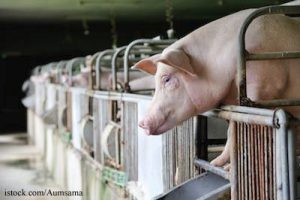Last night, the Iowa House and Senate passed legislation protecting the food industry against whistleblowers. The law would hamper the efforts of people who try to expose problems and wrongdoing in the food industry.
 The House version of the bill would have added criminal penalties against those who record undercover video at agricultural facilities, such as the video that exposed animal abuse at Butterball turkey farms. But that part of the bill would most likely have been unconstitutional, since the U.S. Supreme Court has found that “films exposing animal cruelty represent the exercise of free speech.”
The House version of the bill would have added criminal penalties against those who record undercover video at agricultural facilities, such as the video that exposed animal abuse at Butterball turkey farms. But that part of the bill would most likely have been unconstitutional, since the U.S. Supreme Court has found that “films exposing animal cruelty represent the exercise of free speech.”
In fact, The Occupational Safety and Health Administration (OSHA) filed a lawsuit against Whole Foods last year under the Food Safety Modernization Act. That company fired an employee who raised concerns about a ruptured sewer line that spilled into the store.
The final version of the bill was watered down. It now makes it a crime to make fraudulent statements to obtain employment at these facilities. In other words, if someone gets a job at a turkey processing facility to write a book about abuses and lies about their background, that person could be charged with a crime called “agricultural production facility fraud”.
Proponents of the bill claim that people “being on the facility can bring in infection and disease.” Opponents claim that this measure is a scare tactic to keep employees who witness abuse silent.
The Humane Society is urging the governor to veto the bill. The letter states, in part:
“The intent of this bill is simple: shield animal agribusiness from public scrutiny by punishing whistleblowers and protecting animal abusers. By signing this bill into law, animal agribusiness will have unbridled and unchecked power over worker safety, public health, and animal welfare.
The Des Moines Register editorialized against this legislation, calling it ‘a bill that would punish those who tell the truth,’ and noting that ‘this restraint of free speech cannot be squared with either the U.S. or the Iowa constitutions.'”
Whistleblower protection statutes are codified into federal law, since these claims are often the only way safety violations and illegal animal abuse are uncovered. It remains to be seen if this new law will be found unconstitutional in court challenges. Similar ag-gag bills are active in Illinois, Indiana, Minnesota, Missouri, Nebraska, New York, and Utah.
Supporters of the bill include the Iowa Farm Bureau Federation and Iowa Select Farms. Opponents include the Animal Rescue League of Iowa, Iowa Voters for Companion Animals, the ASPCA, The Humane Society of the United States, Farm Sanctuary, and the American Civil Liberties Union.




